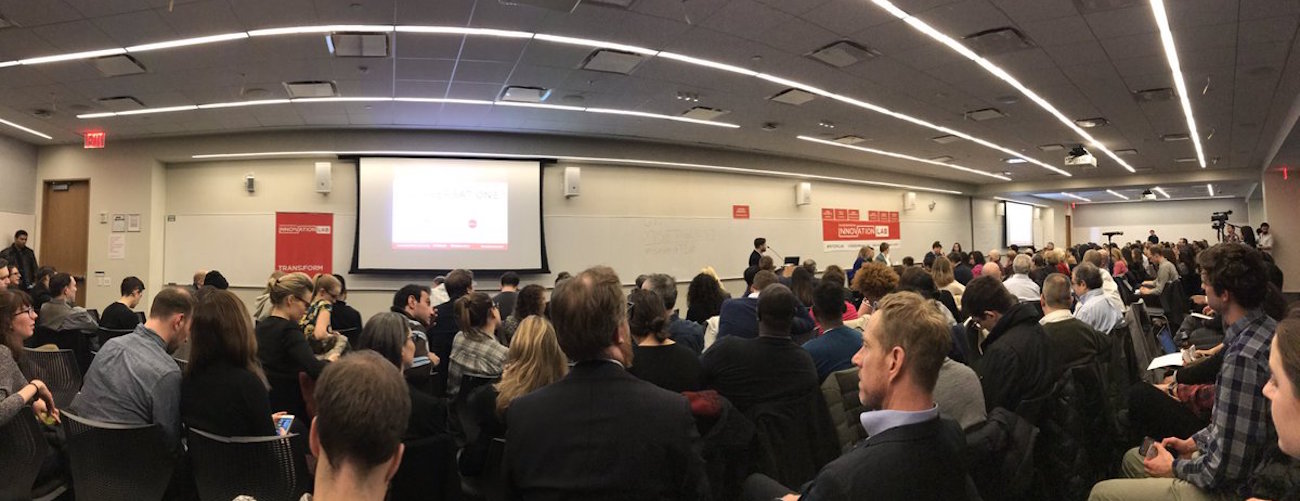“We can solve the problem of fake news.” This was the proposition brought to a lively panel of six experts Wednesday night for a debate hosted by the Daily News Innovation Lab in collaboration with NYC Media Lab. The conversation managed to breathe new life into an overwrought subject, if only to remind the audience of the stakes.
The six were divided into two teams, for and against the proposition, to conduct a classic debate moderated by Justin Hendrix, NYC Media Lab’s executive director. Each side was given equal time to defend their sides:
The “For” Team
Humans can learn. Up first, Jane Elizabeth, a senior manager at American Press Institute, gave a vote of confidence for the human race. Just as we’ve been able to fight smoking, enforce the wearing of seatbelts, and encourage handwashing, we should be able to educate a population to reduce harm. Solving the fake news problem, she said, is not the same as eliminating it.
Remember spam? Next up, Dean Pomerleau, co-director of the Fake News Challenge, pragmatically reminded the audience of a darker time when email inboxes were cluttered with spam. Today, fewer than one in 1,000 spam messages get through. Fake news is similar to spam, just on Facebook rather than Gmail. We will develop technology that detects fake news early, and filters it out–in fact, we are already working on it.
The moral imperative. Sally Kohn, CNN commentator, rounded out the optimism by setting the stakes: We have to solve fake news, for the sake of democracy and truth. We’ve dealt with larger problems than fake news in the past, she said, and if we created the internet, we should be able to fix it. As Thomas Jefferson wrote in a letter: “We are not afraid to follow truth wherever it may lead, nor to tolerate any error so long as reason is left free to combat it.”
“We can, we will, and we must” solve fake news, Kohn said, and “if we don’t think we can, then we won’t.”
The “Against” Team
An information war. It’s an old problem, said Melissa Ryan, an expert in digital campaigns, and one that encompasses many different types of information: conspiracy theories, hoaxes, propaganda, etc. People have been trying to “solve” it for many years, but in the age of social media, it has become militarized–and it is a powerful weapon indeed. According to BuzzFeed, the top fake news stories generated more activity on social media than the top 19 legitimate outlets combined. And it didn’t end with the US election; Germany’s Angela Merkel is now the target of more than 500 fake news stories. Only when we move past the concept of solving the problem, Ryan said, can we deal with it.
Fake news is only a symptom of a diseased industry. Fake news is solvable if you define it narrowly, said David Carroll, associate professor of media design at Parsons School of Design at The New School. But the root of the problem is the business model. The system of ad tech privileges capturing attention over spreading truth. As long as Google and Facebook profit from clicks, there is no incentive to fix the problem. In the meantime, said Carroll, “fake news could topple the EU”—which is, by the way, the “last bulwark against the invasion of privacy.” Fake news, in the end, constitutes a “totalitarian attempt to demolish truth as a power play.”
Technology will only get more powerful. The final speaker, CEO and founder of betaworks John Borthwick, struck the Orwellian note. Social media was built for sharing family photos, he said, and now these same (inherently biased) algorithms are filtering news in the same way. Clicks and notifications produce dopamine. Photoshop-like audio technology is being developed that can make it sound like an individual has said something they haven’t. We have entered a “subjective reality” already, Borthwick said. Quoting Orwell: “It’s a beautiful thing, the destruction of words.”
Ultimately, the debate achieved what debates do best: Laying out the stakes of the problem, but giving listeners a fighting spirit. By a show of hands at the beginning, the audience appeared to be slightly more pessimistic than optimistic about whether we can solve the fake news problem. But by the end, the tables had turned. “Orwell was a warning,” said Kohn in her closing statement, but “Jefferson was an aspiration.”
Nausicaa Renner is digital editor of CJR.


